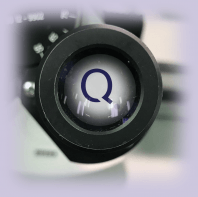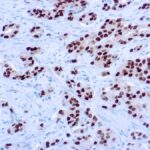 |
What do we see in this antibody?Anti-androgen receptor antibody SPM335 was selected for its excellent specificity in immunohistochemistry as well as for its ability to stain cells for flow cytometry. Unlike clone, DHTR/882, clone SPM335 was generated using only amino acids 299-315 which are not in an active modulating or ligand binding site of human androgen receptor. In our IHC testing, anti-AR staining by clone SPM335 can be primarily observed in glandular epithelial and tumor cells in human prostate carcinoma tissue samples. This finding is consistent with the literature and supports the specificity of anti-AR antibody SPM335. |
Human and Mouse (-) Anti-Androgen Receptor Antibody Product Attributes
Androgen Receptor Previously Observed Antibody Staining Patterns
Observed Subcellular, Organelle Specific Staining Data:
Anti-ar antibody staining is expected to be primarily localized to the cytoplasm and nucleus.
Observed Antibody Staining Data By Tissue Type:
Variations in Androgen Receptor antibody staining intensity in immunohistochemistry on tissue sections are present across different anatomical locations. An intense signal was observed in glandular cells in the epididymis, seminal vesicle. More moderate antibody staining intensity was present in glandular cells in the epididymis, seminal vesicle. Low, but measureable presence of Androgen Receptor could be seen inglandular cells in the cervix, uterine. We were unable to detect Androgen Receptor in other tissues. Disease states, inflammation, and other physiological changes can have a substantial impact on antibody staining patterns. These measurements were all taken in tissues deemed normal or from patients without known disease.
Observed Antibody Staining Data By Tissue Disease Status:
Tissues from cancer patients, for instance, have their own distinct pattern of Androgen Receptor expression as measured by anti-Androgen Receptor antibody immunohistochemical staining. The average level of expression by tumor is summarized in the table below. The variability row represents patient to patient variability in IHC staining.
| Sample Type | breast cancer | carcinoid | cervical cancer | colorectal cancer | endometrial cancer | glioma | head and neck cancer | liver cancer | lung cancer | lymphoma | melanoma | ovarian cancer | pancreatic cancer | prostate cancer | renal cancer | skin cancer | stomach cancer | testicular cancer | thyroid cancer | urothelial cancer |
|---|---|---|---|---|---|---|---|---|---|---|---|---|---|---|---|---|---|---|---|---|
| Signal Intensity | ++ | – | – | – | – | – | – | – | – | – | – | – | – | +++ | – | – | – | – | – | – |
| AR Variability | ++ | + | + | + | ++ | + | ++ | + | + | + | + | ++ | + | + | + | ++ | + | + | + | + |
| Androgen Receptor General Information | |
|---|---|
| Alternate Names | |
| AR, Androgen Receptor, NR3C4 | |
| Molecular Weight | |
| 110kDa | |
| Chromosomal Location | |
| Xq12 | |
| Curated Database and Bioinformatic Data | |
| Gene Symbol | AR |
| Entrez Gene ID | 367 |
| Ensemble Gene ID | ENSG00000169083 |
| RefSeq Protein Accession(s) | NP_000035, NP_001334992, NP_001334993, NP_001011645, NP_001334990 |
| RefSeq mRNA Accession(s) | NM_001348063, NM_001348064, NM_001348061, NM_000044 |
| RefSeq Genomic Accession(s) | NC_018934, NG_009014, NC_000023 |
| UniProt ID(s) | F1D8N5, A0A087WUX9, G4VV16, Q9NUA2, P10275 |
| UniGene ID(s) | F1D8N5, A0A087WUX9, G4VV16, Q9NUA2, P10275 |
| HGNC ID(s) | 644 |
| Cosmic ID(s) | AR |
| KEGG Gene ID(s) | hsa:367 |
| PharmGKB ID(s) | PA57 |
| General Description of Androgen Receptor. | |
| This antibody reacts with a 110kDa protein in western blot which is consistent with the known staining for androgen receptor (AR). This antibody reacts specifically with the newly described A form of the receptor. It does not cross react with the estrogen, progesterone, or glucocorticoid receptors. The androgen receptor plays a normal physiological role in a number of common effects associated with exposure to androgenic hormones. Under pathophysiological conditions, androgen receptor expression is often measured as a therapeutic marker in prostate cancer. Patients with tumors expressing high levels of androgen receptor generally benefit from hormonal therapy like androgen blockade. Additionally, androgen receptor protein levels in prostate carcinoma are sometimes labeled with an anti-AR antibody to estimate tumor differentiation and type. Generally, higher levels of AR expression are associated with lower tumor differentiation. Morpheaform basal cell carcinoma (mBCC) and desmoplastic trichoepithelioma (DTE), two common types of skin cancers exhibit differential expression of androgen receptor and can be differentiated by anti-androgen receptor antibody staining patterns. This monoclonal antibody is superb for staining of formalin/paraffin tissues. |
|

.jpg)

 prostate adenocarcinoma-150x150.jpg)

-150x150.jpg)

-150x150.jpg)

Reviews
There are no reviews yet.